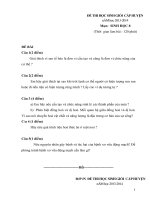chap 8 object manipulation -inheritance c++
Bạn đang xem bản rút gọn của tài liệu. Xem và tải ngay bản đầy đủ của tài liệu tại đây (86.96 KB, 43 trang )
Chapter 8
Programming Fundamentals 1
OBJECT MANIPULATION - INHERITANCE
Chapter 8
Advanced constructors
Destructors
Constant Objects
Static class members
Programming Fundamentals
2
Static class members
Inheritance
Advanced constructors
Constructors can do more than initializing data
members.
They can execute member functions and perform
other type of initialization routines that a class
Programming Fundamentals
3
other type of initialization routines that a class
may require when it first starts.
Parameterized Constructors
Constructors can accept parameters that a client can use
to pass initialization values to the class.
Example: We can have a constructor function definition in the
implementation file as follows:
Payroll::Payroll(double dFed, double dState){
Programming Fundamentals
4
Payroll::Payroll(double dFed, double dState){
dFedTax = dFed;
dStateTax = dState;
};
Once you create a parameterized constructor, you have
to supply parameters when you instantiate a new object.
//Payroll.h
class Payroll{
public:
Payroll(double, double);
private:
double dFedTax;
double dStateTax;
}
//Payroll.cpp
#include “Payroll.h
#include <iostream.h>
Programming Fundamentals
5
#include <iostream.h>
Payroll::Payroll(double dFred, double dState){
dFedTax = dFed;
dStateTax = dState;
};
void main( ){
Payroll employee; //illegal because of no parameter values
……
}
Overloading constructor functions
Constructor functions can be overloaded. You can instantiate
different versions of a class, depending on the supplied
parameters
Being able to overload a constructor function allows you to
instantiate an object in multiple ways.
Example:
//Payroll.h
Programming Fundamentals
6
//Payroll.h
class Payroll{
public:
Payroll(); //three version of constructors
Payroll(double dFed);
Payroll(double dFed, double dState);
private:
double dFedTax;
double dStateTax;
}
//Payroll.cpp
#include “Payroll.h
#include <iostream.h>
Payroll::Payroll(){
dFedTax = 0.28;
dStateTax = 0.05;
};
Payroll::Payroll(double dFed){
dFedTax = dFed;
void main( ){
Payroll employeeFL(0.28);
Payroll employeeMA(0.28, 0.0595);
Programming Fundamentals
7
dFedTax = dFed;
};
Payroll::Payroll(double dFred, double dState){
dFedTax = dFed;
dStateTax = dState;
};
}
Initialization Lists
Initialization lists, or member initialization lists, are another way
of assigning initial values to a class’s data members.
An initialization list is placed after a function header’s closing
parenthesis, but before the function’s opening curly braces.
Example:
Payroll::Payroll(double dFed, double dState){
Programming Fundamentals
8
Payroll::Payroll(double dFed, double dState){
dFedTax = dFed;
dStateTax = dState;
};
You can use initialization list to rewrite the above constructor.
Payroll::Payroll(double dFed, double dState)
:dFedTax(dFed), dStateTax(dState){
};
Parameterized Constructors that Uses Default
Arguments
To create a parameterized constructor that uses default
arguments, we can put the default values at the constructor
prototype.
Example: The class Employee has a constructor with the
prototype:
Programming Fundamentals
9
prototype:
Employee(const int id = 999, const double hourly = 5.65);
This format provides the constructor function with default
values for two arguments. When we create an Employee object,
the default values in the constructor prototype are assigned to
the class variables.
Example 8.1.2
#include<iostream.h>
class Employee{
private:
int idNum;
double hourlyRate;
public:
Employee(const int id = 9999, const double hourly = 5.65);
void setValues(const int id, const double hourly);
void displayValues();
};
Employee::Employee(const int id, const double hourly)
{
Programming Fundamentals
10
{
idNum = id;
hourlyRate = hourly;
}
void Employee::displayValues()
{
cout<<”Employee #<< idNum<<” rate $”<<
hourlyRate<< “ per hour “<<endl;
}
void Employee::setValues(const int id, const double hourly)
{
idNum = id;
hourlyRate = hourly;
}
void main(){
Employee assistant;
cout<< “Before setting values with setValues()”<< endl;
assistant.displayValues();
Programming Fundamentals
11
assistant.displayValues();
assistant.setValues(4321, 12.75);
cout<< “After setting values with setValues()”<< endl;
assistant.displayValues();
}
The output of the above program:
Before setting values with setValues()
Employee #9999 rate $5.65 per hour
After setting values with setValues()
Employee #4321 rate $12.75 per hour
Programming Fundamentals
12
Employee #4321 rate $12.75 per hour
DESTRUCTORS
A default destructor cleans up any resources allocated to an
object once the object is destroyed.
To delete any heap variables declared by your class, you must
write your own destructor function.
You create a destructor function using the name of the class,
the same as a constructor function, preceded by a tilde ~.
Programming Fundamentals
13
the same as a constructor function, preceded by a tilde ~.
Destructor functions cannot be overloaded or accept
parameters.
A destructor is called in two ways;
- when a stack object loses scope when the function in which it is
declared ends.
- when a heap object is destroyed with the delete operator.
Example 8.2.1
//Stocks02.h
class Stocks {
public:
Stocks(char* szName);
~Stocks(); //destructor
void setStockName(char* szName);
char* getStockName();
void setNumShares(int);
int getNumShares(int);
void setPricePerShare(double);
Programming Fundamentals
14
void setPricePerShare(double);
double getPricePerShar();
double calcTotalValue();
private:
char* szStockName;
int iNumShares;
double dCurrentValue;
double dPricePerShare;
};
//Stocks.cpp
#include “stocks_02.h”
#include <string.h>
#include <iostream.h>
Stocks::Stocks(char* szName){
szStockName = new char[25];
strcpy(szStockName, szName);
};
Programming Fundamentals
15
Stocks::~Stocks(){
delete[] szStockName;
cout <<”Destructor called” << endl;
}
…
…
void main(){
Stocks stockPick1(“Cisco”);
stockPick1.setNumShares(100);
stockPick1.setPricePerShare(68.875);
Stocks* stockPick2 = new Stocks(“Lucent”); //heap object
stockPick2->setNumShares(200);
stockPick2->setPricePerShare(59.5);
cout << “The current value of your stock in “
<< stockPick1.getStockName() << “ is $”
<< stockPick1.calcTotalValue()
Programming Fundamentals
16
<< stockPick1.calcTotalValue()
<< “.” << endl;
cout << “The current value of your stock in “
<< stockPick2->getStockName() << “ is $”
<< stockPick2->calcTotalValue()
<< “.” << endl;
delete stockPick2;
}
The output of the above program:
The current value of your stock in Cisco is $6887.5
The current value of your stock in Lucent is $11900
Destructor called.
Destructor called.
The
stockPick1
object calls the destructor when it is
destroyed by the
main()
function going out of
Programming Fundamentals
17
The
stockPick1
object calls the destructor when it is
destroyed by the
main()
function going out of
scope.
The stockPick2 object does not call the destructor
since it is declared on the heap and must be deleted
manually.
To delete the stockPick2 object manually, we add the
statement delete stockPick2; to the main() function
CONSTANT OBJECTS
If you have any type of variable in a program that does not
change, you should always use the const keyword to declare
the variable as a constant.
To declare an object as contant, place the const keyword in
front of the object declaration.
Programming Fundamentals
18
Examle:
const Date currentDate;
Note: Constant data members in a class can not be assigned
values using a standard assignment statement. You must use
an initialization list to assign initial values to constant data
members.
Example:
//Payroll.h
class Payroll{
public:
Payroll();
private:
const double dFedTax;
const double dStateTax;
};
//Payroll.cpp
Using an initialization list
Programming Fundamentals
19
//Payroll.cpp
#include “Payroll.h”
#include <iostream.h>
Payroll::Payroll( ){
dFedTax = 0.28; //illegal
dStateTax = 0.05; //illegal
};
Payroll::Payroll()
:dFedTax(0.28), dStateTax(0.05){
};
Using an initialization list
Constant Functions
Another good programming technique is to use the
const keyword to declare get functions as constant
function.
The const keyword makes your programs more
reliable by ensuring that functions that are not
supposed to modify data
cannot modify data
.
Programming Fundamentals
20
supposed to modify data
cannot modify data
.
To declare a function as constant, you add the const
keyword after a function’s parentheses in both the
function declaration and definition.
Example:
//Payroll.h
double getStateTax(Payroll* pStateTax) const;
//Payroll.cpp
double Payroll::getStateTax(Payroll* pStateTax)
const
{
Programming Fundamentals
21
const
{
return pStateTax->dStateTax;
};
INHERITANE
Inheritance is a form of software reusability in
which new classes are created from existing
classes by inheriting their attributes and
behaviors, and overriding these with capabilities
the new classes require.
Programming Fundamentals
22
the new classes require.
Software reusability saves time in programming
development.
BASIC INHERITANCE
Inheritance refers to the ability of one class to take on
the characteristics of another class.
Base Classes and Derived Classes
When you write a new class that inherits the characteristics of
another class, you are
deriving
or
subclassing
a class.
Programming Fundamentals
23
another class, you are
deriving
or
subclassing
a class.
An inherited class is called the base class, or superclass and
the class that inherits a base class is called a derived class or
subclass.
A class that inherits the characteristics of a base class is said
to be extending the base class since you often extend the class
by adding your own class members.
Base Classes and Derived Classes
When a class is derived from a base class, the derived class
inherits all of the base class members and all of its member
functions, with the exception of: constructor functions, copy
constructor functions, destructor functions and overloaded
assignment (=) functions
A derived class must provide its own implementation of these
functions.
Programming Fundamentals
24
The class header declaration for a derived class Customer
which inherits the characteristics of the Person class is as
follows:
class Customer: public Person
{
……
}
Once you extend a base class, you can access its class
member directly through objects instantiated from the
derived class.
Example 8.4.1
#include<iostream.h>
#include<string.h>
class Person
{
Programming Fundamentals
25
{
private:
int idnum;
char lastName[20];
char firstName[15];
public:
void setFields(int, char[], char[]);
void outputData( );
};









